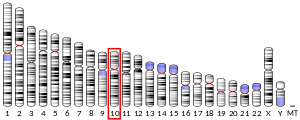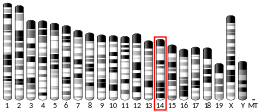ADK (gene)
Adenosine kinase is an enzyme that in humans is encoded by the ADK gene.[5][6]
Function
This gene encodes adenosine kinase, an abundant enzyme in mammalian tissues. The enzyme catalyzes the transfer of the gamma-phosphate from ATP to adenosine, thereby serving as a regulator of concentrations of both extracellular adenosine and intracellular adenine nucleotides. Adenosine has widespread effects on the cardiovascular, nervous, respiratory, and immune systems and inhibitors of the enzyme could play an important pharmacological role in increasing intravascular adenosine concentrations and acting as anti-inflammatory agents. Alternative splicing results in two transcript variants encoding different isoforms. Both isoforms of the enzyme phosphorylate adenosine with identical kinetics and both require Mg2+ for activity.[6]
References
- 1 2 3 GRCh38: Ensembl release 89: ENSG00000156110 - Ensembl, May 2017
- 1 2 3 GRCm38: Ensembl release 89: ENSMUSG00000039197 - Ensembl, May 2017
- ↑ "Human PubMed Reference:".
- ↑ "Mouse PubMed Reference:".
- ↑ Spychala J, Datta NS, Takabayashi K, Datta M, Fox IH, Gribbin T, Mitchell BS (Mar 1996). "Cloning of human adenosine kinase cDNA: sequence similarity to microbial ribokinases and fructokinases". Proc Natl Acad Sci U S A. 93 (3): 1232–7. doi:10.1073/pnas.93.3.1232. PMC 40062. PMID 8577746.
- 1 2 "Entrez Gene: ADK adenosine kinase".
External links
- Human ADK genome location and ADK gene details page in the UCSC Genome Browser.
Further reading
- Klobutcher LA, Nichols EA, Kucherlapati RS, Ruddle FH (1976). "Assignment of the gene for human adenosine kinase to chromosome 10 using a somatic cell hybrid clone panel". Cytogenet. Cell Genet. 16 (1–5): 171–4. doi:10.1159/000130582. PMID 185014.
- Singh B, Hao W, Wu Z, et al. (1996). "Cloning and characterization of cDNA for adenosine kinase from mammalian (Chinese hamster, mouse, human and rat) species. High frequency mutants of Chinese hamster ovary cells involve structural alterations in the gene". Eur. J. Biochem. 241 (2): 564–71. doi:10.1111/j.1432-1033.1995.tb20220.x_1. PMID 8917457.
- McNally T, Helfrich RJ, Cowart M, et al. (1997). "Cloning and expression of the adenosine kinase gene from rat and human tissues". Biochem. Biophys. Res. Commun. 231 (3): 645–50. doi:10.1006/bbrc.1997.6157. PMID 9070863.
- Mathews II, Erion MD, Ealick SE (1998). "Structure of human adenosine kinase at 1.5 A resolution". Biochemistry. 37 (45): 15607–20. doi:10.1021/bi9815445. PMID 9843365.
- Van Rompay AR, Johansson M, Karlsson A (1999). "Identification of a novel human adenylate kinase. cDNA cloning, expression analysis, chromosome localization and characterization of the recombinant protein". Eur. J. Biochem. 261 (2): 509–17. doi:10.1046/j.1432-1327.1999.00294.x. PMID 10215863.
- Singh B, Lin A, Wu ZC, Gupta RS (2001). "Gene structure for adenosine kinase in Chinese hamster and human: high-frequency mutants of CHO cells involve deletions of several introns and exons". DNA Cell Biol. 20 (1): 53–65. doi:10.1089/10445490150504693. PMID 11242543.
- Maguire PB, Wynne KJ, Harney DF, et al. (2003). "Identification of the phosphotyrosine proteome from thrombin activated platelets". Proteomics. 2 (6): 642–8. doi:10.1002/1615-9861(200206)2:6<642::AID-PROT642>3.0.CO;2-I. PMID 12112843.
- Strausberg RL, Feingold EA, Grouse LH, et al. (2003). "Generation and initial analysis of more than 15,000 full-length human and mouse cDNA sequences". Proc. Natl. Acad. Sci. U.S.A. 99 (26): 16899–903. doi:10.1073/pnas.242603899. PMC 139241. PMID 12477932.
- Szkotak AJ, Ng AM, Man SF, et al. (2003). "Coupling of CFTR-mediated anion secretion to nucleoside transporters and adenosine homeostasis in Calu-3 cells". J. Membr. Biol. 192 (3): 169–79. doi:10.1007/s00232-002-1073-x. PMID 12820662.
- Gerhard DS, Wagner L, Feingold EA, et al. (2004). "The status, quality, and expansion of the NIH full-length cDNA project: the Mammalian Gene Collection (MGC)". Genome Res. 14 (10B): 2121–7. doi:10.1101/gr.2596504. PMC 528928. PMID 15489334.







